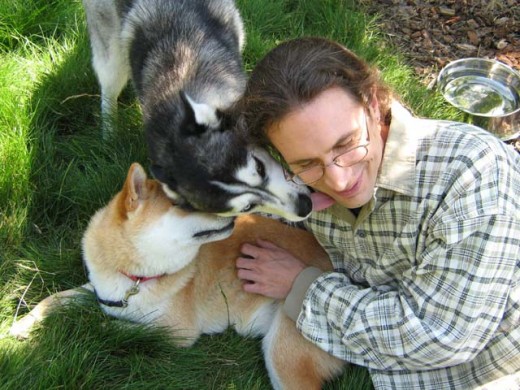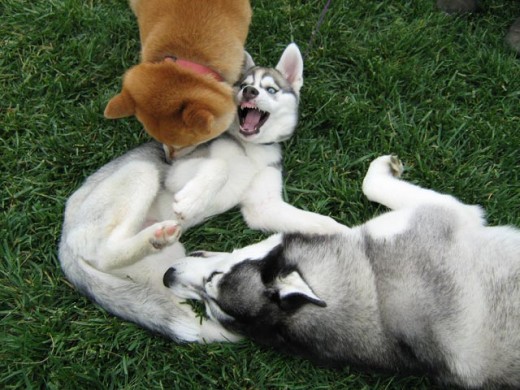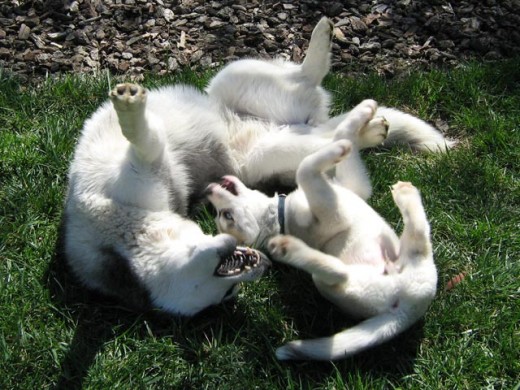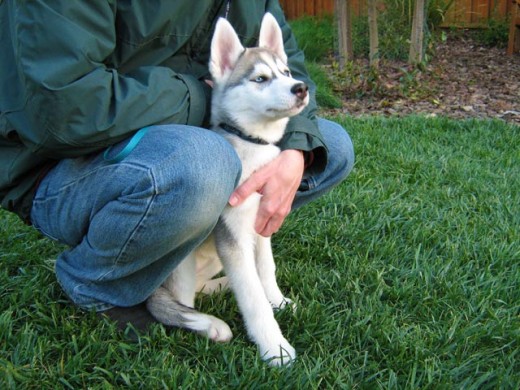My trainer said something interesting the other day. She claimed that dog-to-dog socialization is mostly for us humans; so we can conveniently take our dog with us everywhere.
Dogs according to her, really need to socialize with their people, but are perfectly happy with or without other dogs around. She said that dogs are happier curled up in bed with us, with a piece of steak, than they are socializing with their dog friends.

When we watch puppies at play, it is easy to believe that dogs really do need interaction with other dogs. They are so exuberant in their play, they have so much fun with each other, and then they just plop down in a puppy heap and fall asleep.
How can a human compete with that, much less replace it?
Here we consider what do dogs need, from a social perspective.

Dogs Need People

Dogs really need quality time with their people.
- Certain dogs, like my Shiba Inu, need to be with people that they have bonded with,
- While others, like my Siberian Husky, are happy as long as there are people around to interact with.
It is important to spend some quality time with our dog every day. Play time, obedience training, and daily walks, are all important, and will help establish trust, respect, and a lifetime bond.
We also need to be a good pack leader, and teach our dog the proper rules of behavior in a human world. This can be done by following the Nothing in Life is Free (NILIF) program, and using reward obedience training.

Dogs Need Socialization


Dogs may not need other dogs, but general socialization is extremely important.
Because our dogs live in a human world, it is important to expose them to a variety of environments, dogs, people, and weird objects (e.g. umbrella, balloons, garbage truck); in a positive way.
Young dogs learn faster, are more curious, impressionable, and eager to please. Therefore, I start dog socialization exercises early-on, when I first get a new dog. I carefully manage my dog, and make sure not to expose him to more than he can handle. Note that young dogs go through certain critical fear periods, where they are more susceptible to new external stimuli, so I am especially careful during those times.
I always start small and slowly build-up the social challenge, so that my dog will enjoy the encounter, and be successful at it. Success builds confidence, and breeds more success. Negative experiences, on the other hand, causes a dog to become fearful and uncertain. If a dog is fearful of people or objects, be sure to desensitize him to the problem stimulus slowly.
Remember that socialization is not only about the quantity of new experiences, but also about the quality of those experiences.
A well-socialized dog, that is confident and comfortable with his surroundings, is a joy to have around, and can follow us everywhere. He is less likely to misbehave or use aggression, even in stressful and unexpected situations. Instead, he trusts us to handle things, and is a happier and more balanced dog as a result.

Dogs Need Our Protection
Do not expect a dog to like socializing with all other dogs.
Many dog movies and television shows present an unrealistic image of the dog.
- He is naturally obedient and loyal,
- Magically understands verbal commands in at least 5 different languages, and
- Loves all people and animals (except for the bad guys).
The truth though, is that most dogs are not Lassie, and will not enjoy the company of all people or all dogs.
In He Just Wants to Say Hi, Suzanne Clothier illustrates how dogs have social boundaries, just as we do. We do not allow strangers to come up to us, invade our space, and physically man-handle us. We should not allow strangers to do that to our dogs either, especially if he dislikes having his space violated.
Always observe and listen to what our dog is trying to say. Understand his social boundaries, and protect him from rude dogs as well as rude people.
When adding a second dog to the family, it is best to introduce our existing pack to the new dog on neutral territory (e.g. a quiet park, empty parking lot). See if the new dog is accepted, and assess his temperament to determine how he may alter pack dynamics.
Opening our home to a new puppy or new dog, especially a shelter dog, is an awesome thing to do. However, I believe that the addition should not be made at the expense of our existing dogs.

Age, bad experiences, as well as physical health issues may change our dog’s social tolerance.
Puppies need to be with their mother and litter-mates until they are about 8 weeks old. Playing and interacting with his brothers and sisters, will help a puppy learn social manners, bite inhibition, and other useful skills. A puppy’s mother and adult relatives, also help to set consistent rules and boundaries for him, at an early age.
As a puppy matures, he becomes more independent, and has a lesser need for other dogs. In fact, if not properly socialized, he may become fearful and cautious. Depending on breed, some dogs may also develop stricter social boundaries, and may not want unknown dogs or people crowding their space, touching them, or sniffing their butt.
It is important to ensure that our dog’s interactions with other dogs are not negative. Too many negative experiences may cause him to become fearful and aggressive toward other dogs.

My Shiba Inu does not have very good dog greeting manners. He is a very in your face dog, and regularly annoys other dogs by invading their space without permission. I manage him very carefully, and when we see other dogs, we just calmly move on.
In this way, he is learning avoidance and building up many neutral dog-to-dog experiences. Doing desensitization training with balanced, well-socialized dogs, can also help improve a dog’s greeting skills.

Note that health and physical issues may also affect a dog’s social behavior and social comfort level.
I have a three-legged Siberian Husky who is friendly, but cautious with other dogs. Three legged dogs, seniors, and dogs with joint pain or other physical illness, will naturally feel more vulnerable. As such, they may perceive most things as threats, and may respond with aggression to protect themselves, especially when they feel cornered.
It is crucial not to expose such dogs to overly stressful situations, and to always protect them from unwanted attention (dog and human).

Dogs Need Companionship
Dogs may not need to socialize with other dogs, but if they can have a friendly dog companion, so much the better.

One of the best things we can get for our dog, is another compatible dog to play with.
My Shiba Inu loves wrestling and chasing, and it is just not possible for us humans to truly play dog. We cannot run very fast, and our wrestling skills are very limited compared to theirs.
In addition, it is generally not a good idea to wrestle and play rough with a dog. This may encourage him to start playing rough with other people, including children, seniors, or even adults that are fearful of dogs.
Unless we have great off-leash control over our dog, it is safer to institute the “no wrestling with people” rule, at all times.



I got a Siberian Husky puppy, after my Shiba Inu reached his first birthday. I waited 1 year before getting a second dog, because I wanted some alone time to bond with my Shiba.
If we get two puppies together, they may just bond with each other, and never truly warm up to human company. If we wait too long to get a second dog, our existing dog may get too set in his ways, and may not like to share with a new canine companion.
I chose a Siberian Husky because they are active dogs that like chasing and wrestling, just like my Shiba. Certain breeds may prefer retrieving balls or herding, so it is important to evaluate our dog, and pick a breed that is compatible with his play style and interests.
We can also –
- Organize small playgroups with friendly neighborhood dogs,
- Find a good dog daycare, or
- Hire a dog walker to take our dog on group walks at the park.
Enclosed dog parks are a risky alternative, because the environment is often unstructured, over-stimulating, and lacking in proper human supervision.

Do Dogs Really Need Other Dogs?
The dictionary definition of need, in this context, is to
require (something) because it is essential or very important
~~[Oxford American English Dictionary]
- I think that our dogs really need their people, but they do not really need the company of other dogs. Many dogs live perfectly happy lives, being an only child in the family.
- I think that general socialization, including dog-to-dog socialization (i.e. helping our dog be comfortable in the presence of other dogs), is important for us and our dogs. It will allow us greater flexibility and enrich our time together.
- I think that just like people, different dogs have different temperaments and social preferences. Some dogs are more dog-social, some dogs are more dog-tolerant, some dogs prefer the company of people, and some dogs prefer their own company. Social preferences and tolerances may also change based on mood, past experiences, health, and more.
- I think all of my dogs would prioritize steak, above most other things, most of the time. 😀 People with food probably comes next, and then other dogs.
- I think that my trainer’s “steak statement” is mostly accurate, i.e., it is probably true for many dogs, most of the time. This does not mean that my dogs do not enjoy interacting with other dogs, only that they prefer a juicy steak more!
What do you think? Do dogs need other dogs? In particular, is the company of other dogs essential to our dog’s life, or can they lead perfectly happy lives with just the company of people.
How old was Sephy when you got Shania? We would like to have 2 dogs but have so many questions! Both of us has always only had one dog in our families when we were younger so this is completely new territory for us. Reptar is finally out of the expensive vet visit stage and we fully plan to enjoy just him for a while longer but when we do decide to get another pup other than ensuring that the dogs like each other first, what else do we consider?
Should the dogs have separate crates or should they be in an enclosed space together? How about when we are not home?
What can we expect from Reptar with a new puppy around? Is he going to revert back from all of the obedience he’s learned thus far?
Is it likely he will become aggressive because he is used to being “the only child”?
I really don’t know what other questions to ask to prepare. Any insight and experiences would be greatly appreciated! I looked through your older blog posts to see if you already covered this topic, so I apologize if it is posted and I missed it!
Thanks!
The new pictures of Reptar are great! That was some Christmas present! lol.
Does Reptar also like shoes? Sephy likes sleeping on the shoe mat next to the shoes. I guess they smell good to him.
Also love the pictures with Goofy. Nice to have playmates like that around the neighborhood. I am always on the lookout for good playmates for Sephy but they can be hard to find.
Re Second dog –
That is so exciting!
What breed are you thinking of getting? Sephy tends to overwhelm small dogs with his crazy play style so I deliberately picked a larger breed, that also has the same crazy wrestling play style.
I also picked a puppy that was more naturally submissive in nature because Sephy does not usually get along with more dominant dogs.
I first took Shania home for a test-drive week to see if she would get along with Sephy. Most good breeders will let you do that, and most adoption/rescue places will as well.
I will probably write a post about this – it is a great topic! 🙂
I have a Maltese that I adopted that had some abuse and was not socialized. Despite this, she is very sweet to me, not so much my children. I got a yorkie 2 years later. The two dogs are not aggressive at all with each other, but do not play with each other. It has been over a year now since I have had the two together. Lately, the Maltese has been lying in the Yorkie’s dog bed when he is not in it. Is the Maltese trying to socialize or claim the Yorkie’s territory?
Hi Nikki,
It is hard to tell without observing the dogs. Both my dogs share all their beds, toys, etc – so for them it is not about claiming territory or dominance. I think that most of the time, dogs are just living their lives, and dominance does not enter into the equation at all.
Does the Maltese try to mark the bed? Will the Maltese guard the bed from you or the Yorkie? If so – then it may be more of a territorial thing.
Other than that, he is probably just looking for a comfortable spot to lie on and is comfortable with your Yorkie’s scent.
I would say yes, having another dog is good. We had a Doberman and Yorkie who were best pals for years. When Nellie the Dobie died, Andy the Yorkie was looking for her for weeks. It about killed me to see that.
Now I have a German Shepard mix who’s about nine, actually she belongs to my fiance. I suggested we get another dog because we both work and Samina was getting, I thought, lonely with nothing to do during the day. So we got Lucky, who is 1/2 wiener dog and 1/2 Basset. He’s sort of the Hulk version of a regular Dachshund.
At first Samina wanted nothing to do with him. It took some time, but she warmed up to him and now they’re best buddies. Plus Samina is more active because they play now and I think she’s doing much better.
Thanks for sharing your story, ledefensetech.
I think what you say is very true. There are great health benefits to bringing in a younger dog as a companion for an older dog.
Been wanting to write a “second dog” hub for a while now … but I get easily distracted 🙂
Tell me about it. There’s so much to do and so little time in which to do it.
Another great hub 😀 My dogs enjoy playing with one another but also have times where they are apart. I think the need a little of both lol.
Yeah mine are the same. I love watching them play though. They have so much fun and when they stop for a rest, they have the goofiest wide grins on their faces. I think they are just panting, but it still looks like a goofy, wide-grin to me 🙂
Mine are the same way lol. It’s fun to watch them play
Do not expect your dog to like all other dogs.
This is so true-I have a Staffy that loves most dogs except her own breed-really gets aggressive towards other Staffys-so I just take extra care in that situation-all other breeds she seems fine with-Real strange
Yeah I know what you mean. There is this black and tan terrier in my neighborhood that really makes my Sibe sing. She is usually quiet with other dogs, but she gets extremely excited when she sees this terrier.
I have gotten some books on dog body language but frequently it is still difficult for me to catch what dogs are trying to say to us and each other. It could also be a past experience thing. If that is the case, desensitization exercises could work well.
My Shiba is also an interesting fellow. He does not like more dominant type dogs, so I just keep him away from them. Like you, I just choose playmates that I know will enjoy his company and vice versa.
Great info. The part about invading their space is so true. Not just with other dogs, but people. When kids see a dog they just want to crowd around it, they don’t realize that this totally freaks the dog out.
Yeah kids also tend to make fast hand movements, and may run around a lot which may trigger a dog’s prey instinct. I think it is important for parents to teach their children how to meet dogs properly, and what to do if they meet unknown loose dogs in the neighborhood.
#2 is a very good point, thanks Shibashake!
Thanks DawgDad. I took my dog to SIRIUS puppy class when he was young, and they really emphasized the importance of dog socialization; including socialization to other dogs, all types of people, people wearing weird gear, strange objects, etc. It was a very fun class, and it helped my dog be more balanced and outgoing.
Excellent hub. I find that dogs are much like humans when it comes to socializing. Most want to be, but some just likes to be left alone.
Thanks jackinabox. I think you are right. Dogs really need to have someone (human or dog) around to interact with most of the day. If they don’t have that, they will probably escape, or may get destructive at home.
My Shiba Inu likes being by himself most of the time, but he still wants someone to be around the house. He gets unhappy whenever he is left alone at home so we keep that to an absolute minimum.
Our dog was aggressive, until we adopted a 2nd dog. Now she’s a sweetie!
I think your trainer doesn’t quite understand dogs. They are pack animals and most will prefer their own kind. If they have been around only humans from a very early age, then we become their pack.
Even with my 4 dogs, who have been brought up with humans and dogs, they adore us and we are part of their pack; BUT there is a very special relationship they have with each other too. I think they would be missing out on something wonderful if they didn’t have each other too.
No question that dogs love company and do not enjoy being alone- they are pack animals after all.
I will not home puppies with anyone that goes to work full time and cannot take their dog with them and I recommend that if they have to leave their dogs for part time work then they have an appropriate age, breed and temperament of dog as a companion. I think that two dogs can be easier to have than one if the above considerations are adhered to.
Jo
Jo & Cathy, thanks very much for your comments. I agree with the both of you. My Shiba Inu certainly got a lot happier after we got our second dog. Now he gets really depressed whenever she leaves, even if it is just for a short vet visit.
However, I think that what Jo says is very important – “an appropriate age, breed and temperament”. We should not expect our dogs to like or even get along with “just any” random dog.
Finally, I probably didn’t describe this properly in my post, but what my trainer suggested is not that dogs dislike the company of other dogs, but rather that they prefer the company of humans to that of dogs. I think that she is mostly correct, especially for the more domesticated breeds. The more primitive, wild breeds, however, tend to be more aloof, and seem to have less of a need for human attention. My Shiba Inu is more like that. My Sibe, however, loves people much more than other dogs.